Undergrads Experience Open Source Software & Interdisciplinary Research Via INCLUSION REU
August 13, 2018
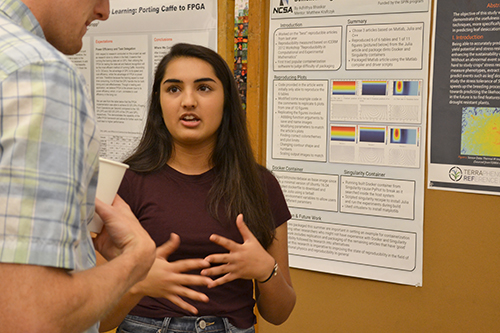
An INCLUSION REU participant, Lisa Kanbur, presents her research at the end-of-the summer Poster Session at NCSA.
Eleven US undergraduate students participated in the second summer of NCSA’s NSF-funded INCLUSION (Incubating a New Community of Leaders Using Software, Inclusion, Innovation, Interdisciplinary and OpeN-Science) REU (Research Experience for Undergraduates), which this year also included a trial of an international partnership with one international student working alongside the US students. Students gained skills they hope to employ down the road, including using Open Source Software; most improved their coding skills or learned a new programming language. Plus, they created a poster then presented their research at the Illinois Summer Research Symposium and at the end-of-the-summer poster session at the NCSA (National Center for Supercomputing Applications). Participants also made some new relationships with each other and with others at Illinois, including their mentors.
One goal of the INCLUSION REU project, according to PI, Daniel S. Katz, NCSA's Assistant Director for Scientific Software & Applications and Research Professor (iSchool, Electrical and Computer Engineering, and Computer Science), was for participating undergraduate students to develop software and/or contribute to software projects, specifically projects using Open Source Software, software that is free for users to view and modify. Another program emphasis was to foster interdisciplinary collaboration across all fields, not just computer science. Thus, the projects in which students participated were led by two mentors from different disciplines. As for the REU’s third goal, its name—INCLUSION—says it all: to make the population of software developers more diverse. “While anyone can contribute to open source projects, it’s important that we don’t only rely on those who can afford to do so without reward, and that we provide all members of the scholarly community with opportunities to get involved,” Katz said.
The participants hailed from around the country and beyond (one was an international student), while three were from the University of Illinois at Urbana-Champaign. While many of the students were computer science or computer engineering majors, a couple were studying physics and another chemistry, some minors ranging from math, to Italian, to English. Regarding increasing the diversity among software developers via inclusion of underrepresented students, most (eight) of the participants were females, plus a number were underrepresented minorities: two were Latina, one was Latina/American Indian, and one student was African American.
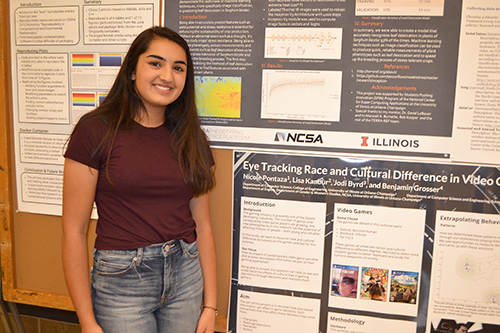
Lisa Kanbur by her poster about using eye tracking to look at race and cultural differences in video games.
The participants' reasons for participating in INCLUSION varied. For instance, Lisa Kanbur, a rising sophomore in Computer Science at the University of Buffalo in New York, was encouraged to apply for an REU by her parents and her mentor at school. So after doing some research, she found the INCLUSION REU at Illinois. Intrigued by its “cool projects,” she reports, “I figured it sounded like a good program.”
What interested her the most about the REU was the opportunity to not only get research experience but to learn about the grad school process. Still in the early stages of her college career, she didn't know too much about it. But because students she knows at school have been applying to grad schools, she was curious about the process. “So I knew this program would give me information to make a decision on whether or not I wanted to go to grad school,” she remarks.
Kanbur’s research used eye tracking to look at race and cultural differences in video games as a result of bias in algorithms coming from institutional racism. She and her research partner, Nicole Pontaza (in her second summer in the REU), used an eye tracker: hardware hooked up to the bottom of the computer monitor which was able to detect what a participant was looking at during specific points in a game.
Kanbur explains that by examining these data, she and Pontaza were able to extrapolate patterns at specific points in each game that they thought were important. The goal was to determine what the person was looking at in each timeframe or screenshot of the game and then, based on that, make conclusions about what decisions they made or whether something affected another decision.
Pontaza had gathered data last summer, so this summer the two focused on developing software to extrapolate patterns from the data. Kanbur says that in the future, they want to visualize the data better and look at more games and see what other controversial moments they can look at in each of three games.
Kanbur indicates that the most challenging thing this summer was learning a new programming language: C-Sharp. Plus, because the eye tracker they used came with a software development kit for Microsoft Visual Studios, she also had to become familiar with that software as well.
Kanbur says she grew personally from the experience. “I feel more confident in myself as a student now that I have this research experience,” she admits. “I think I can…talk more confidently about my experiences and make more informed decisions about what I want to do later on. So this program really helped me with that.”
Plus, she may also have gained clarification regarding her future career plans. Now that she’s experienced research, she might want to continue doing it: “I definitely would like to…use some of my computer science skills and…bridge it with the humanities and see what I could do with that.”
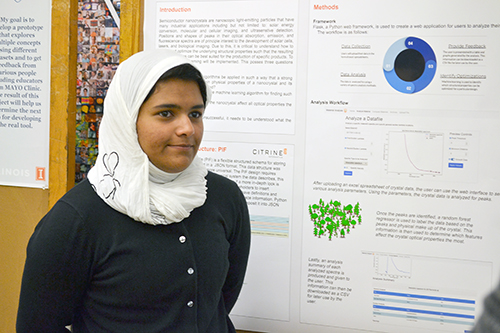
International INCLUSION REU parter undergrad Lujain Fatta presenting her research at the end-of-the-summer poster session at NCSA.
Another participant, international student Lujain Fatta, a rising junior studying Biomedical Engineering at Rose Hullman Institute of Technology in Terre Haute, Indiana, says she ended up in the NCSA summer program because she’s required to do some program in the summer, and her scholarship advisor suggested this one.
A biomedical engineering major, Fatta calls ther research this summer “pretty biomedical.” She and her research partner, Patrick Shinn, were trying to reverse engineer the design of a nano crystal. She explains that the physical composition and shape of a crystal affects the position of a peak in the absorption spectrum. “So we wanted to write a machine-learning code that can learn from the existing data so it will do the reverse.” Instead of what is being done right now—designing crystals then measuring the spectra—the goal was to determine where the peak should be then have the software create the design of the crystal.
Fatta says the most challenging thing about this summer was using Python.
“I know how to program,” she explains, “but not in Python. So I had to learn Python pretty quickly.” Another challenge was that the code they were using was written without any comments, “So I had no idea what it does,” she explains. “We had to take it apart piece by piece and see what every piece does...I learned a lot.”
Besides learning Python, Fatta, who says she had the chemical background for the research they were doing, also learned a lot about semi-conductor nano crystals. “I feel like I've grown a lot,” she acknowledges. She also grew relationally: “I met a lot of people,” she adds.
Did participating in the program impact her future career plans? “Yeah, kind of,” she admits. For one, she got the message about the benefits of interdisciplinary learning.
“It just made me think I need to take more computer science classes, because it goes hand in hand. You can't just be an engineer or just be a computer scientist. You need to know a little bit of both.”
Her assessment of the summer? “It's been a really great experience, and I've learned a lot,” she adds.
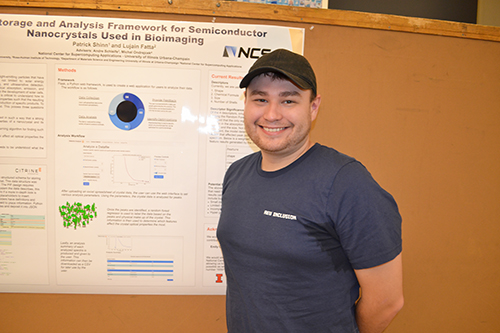
An INCLUSION REU participant, Patrick Shinn, by his poster about building a framework for data collection for semiconductor nanocrystals.
Fatta’s research partner was Patrick Shinn, a rising senior majoring in Computer Science and minoring in math at Marshall University. He found out about the INCLUSION REU when researching REU sites on the NSF website. After discovering that Illinois was ranked #10, “I was like, ‘Oh, this is a great opportunity!’ and I applied that way.”
Shinn spent the summer working with Fatta to build a framework for data collection for semiconductor nanocrystals. He indicates that one of the challenges he encountered was related to the interdisciplinarity of the project. “So I knew the CS specs, because that's my background, but the material design science aspect—I had no idea what that was, so I was kinda’ just like ‘Okay, what do I do with this? Okay, cool!’"
For one, he found the analysis aspect when creating the framework to be challenging. “So when you upload a crystal sample file, you would analyze the file, and I had no idea what to analyze it for.”
Elaborating on Fatta’s comment about the code’s lack of comments, he stresses that while there was already a preexisting code base, the author hadn’t included any comments in the code. “The person just wrote it, and so I tried to figure out what that code was doing, but I didn't have a background in the science aspect, so trying to figure out what that code was doing and how it applied to the crystals, that was probably the biggest challenge,” he explains. Having someone from the discipline, his partner Fatta, workig alongside him helped.
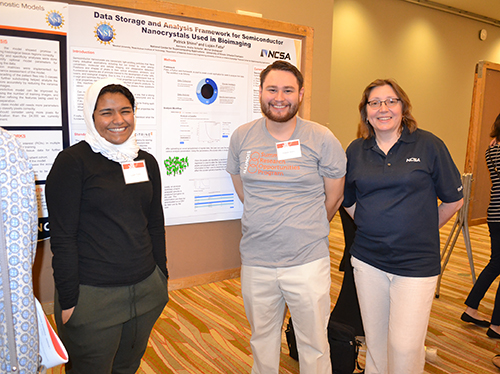
Left to right: INCLUSION REU participants Lujain Fatta and Patrick Shinn, along with Olena Kindratenko, INCLUSION co-PI and project coordinator, at the Illinois Summer Research Symposium, where the two presented their research.
Shinn stresses that it would've helped more if the code had been documented. “When you look at somebody's code,” he elaborates, “you look at how they think. The way you write code, all it is is logic. It's how you think to solve a problem. So unless you tell that person what your thought process is, they're not going to follow the same way because everybody thinks in a different manner.“
However, despite the challenges of the experience, Shinn indicates that some of the benefits for him personally were getting to travel and coming to Illinois.
“I don't normally get a whole lot of opportunities to travel,” he says, “so I got to travel halfway across the country (Marshall U is in Huntington, West Virginia) and see new places, so that was really interesting. And I got to see the campus here; the campus is absolutely beautiful. It's about four times the size of my home institution, and my whole campus fits on the main quad out here, so that was really cool.” Plus, he adds, “I got to meet a lot of interesting people I'd never met before: a bunch of people from New York, California, Detroit—all kinds of cool stuff.”
Katz says, “Overall, it was a great summer program for our students. They developed new research and communication skills, met new people, had new experiences, and now have new opportunities for their futures.”
For more I-STEM articles about the INCLUSION REU, see:
- INCLUSION REU Seeks to Foster Diversity While Exposing Undergrads to Coding Via Open Source Software
Story and photographs by Elizabeth Innes, Communications Specialist, I-STEM Education Initiative.
More: Computer Science, REUs, REU: INCLUSION, Undergraduate STEM Outreach, 2018













.jpg)
















